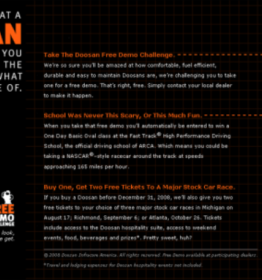New Flurry of RIAA Lawsuits
(Wired) The music industry sued another 531 people on Tuesday in several courts across the United States for sharing copyrighted music on the Internet illegally, the Recording Industry Association of America said. Like the 532 people it sued last month, the RIAA identified its targets by the “John Doe” process, where the identities of these alleged file swappers are unknown. The defendants are listed by their Internet Protocol address. Those identified had shared an average of 800 copyright files, the RIAA said.
The music trade group bundled the defendants together in five lawsuits filed in federal courts in Atlanta; Orlando, Florida; Philadelphia and Trenton, New Jersey.
Legal music sites “shouldn’t have to compete with businesses based on illegal downloading,” RIAA President Cary Sherman said in a statement. “That’s why we are sending a clear message that downloading or ‘sharing’ music from a peer-to-peer network without authorization is illegal, it can have consequences and it undermines the creative future of music itself.”
This new round of legal action brings the total number of individuals sued to 1,445 since September. That month, the RIAA said it would begin taking legal action against people who share copyright files over peer-to-peer networks like Kazaa and Grokster.
The RIAA said 381 settlements have been negotiated with file traders, including two who were sued last month. The group was also successful in identifying specific online music swappers after federal judges in New York approved an industry motion to subpoena Internet service providers to reveal the real names of the defendants.
Cindy Cohn, legal director of the Electronic Frontier Foundation, which opposes the RIAA’s campaign, said that her group will probably file briefs in defense of the defendents, as it has done in the past. The EFF objects to the way the music industry has been filing John Doe lawsuits.
Previously, the RIAA had relied on the quicker subpoena power of the Digital Millennium Copyright Act, which only required the signature of a court clerk to subpoena names of suspected copyright infringers. In December, a federal court ruled that the DMCA does not allow such practice, so the RIAA turned to filing John Doe suits instead.
The RIAA has been filing the suits in jurisdictions where ISPs are based.
“It is unlikely that they have jurisdiction over these people where they sued because most ISPs have customers nationwide,” Cohn said.
Cohn said just because an ISP is located in a certain jurisdiction does not mean that individuals should be forced to defend a lawsuit in a different area than where they live. She said each of the claims against individuals must be evaluated on its own merit.
“It’s clearly not appropriate to lump a bunch of people into a single lawsuit when they don’t have any connection to each other,” Cohn said. “The basic legal protection that your case will be judged on its own merits should not be cast aside in the recording companies’ crusade against its customers.”



















